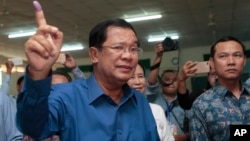At a graduation ceremony held earlier this month, Prime Minister Hun Sen launched into a tirade against his opponents, whom he accused of longing for his death. He issued a warning: people hoping for his end would be targeted by the armed forces and the country, in his absence, would fall into a state of “social unrest”.
“If the prime minister dies, there will be no government; everything will be dissolved. There will be no deputy prime ministers, ministers, meaning that the Kingdom will have no leader. If there’s no leader, what will happen? It will be very dangerous,” he said.
“The armed forces are ready to take action and do what they want to do. It is better for Hun Sen to stay alive. If you pray for Hun Sen’s death, you will also easily die.”
Man of power
Human rights observers, however, say that while Hun Sen’s more than 30-year grip on Cambodia may seem unshakable, his rule cannot last forever.
“The moment that a politician believes that he is indispensable to the effective running of the country, red flags should go up,” said Phil Robertson, deputy director of Human Rights Watch’s Asia division. “What this shows is the mindset of the leader who forgotten the idea that governments are supposed to help people and make their lives better, not prey upon them through extortion a duplicity.”
“What we have seen from Hun Sen is that he believes that only he can maintain security and stability and he's prepared to abuse whatever rights he needs to in order to keep control,” he added.
Robertson declined to comment on whether Hun Sen’s government was on shaky ground, the premier’s comments seem to indicate concerns over the outcome of Cambodia’s political future.
“The profit you gain from Hun Sen’s death is smaller than keeping Hun Sen alive,” he said. “I want to be clear about this. At the moment, Hun Sen is in control of all armed forces.”
The comments come after rumors the prime minister was suffering from an unspecified health condition, prompting discussion over the ruling Cambodian People’s Party’s plans for the eventuality that he should pass away.
Grip on power
Sebastian Strangio, an author of Hun Sen’s Cambodia, said Hun Sen thought of himself as indispensable to the nation and he could not say whether the premier would accept a peaceful transfer of power if the opposition won next year’s general election.
“It's true there's not really any independent institution ... that can pick up from Hun Sen if he would step down from power. [H]is authority remains central to the preservation of ... political stability in the country at the moment. And this is one of the weaknesses of his legacy ... that for all the prime minister's achievements over the last 20 or 30 years, there's no guarantee that his achievements will outlive the prime minister himself,” he said.
Hun Sen has been careful not to reveal a potential successor, while Strangio said the structure of the CPP ensures that he cannot make the decision himself. His insistence that he is necessary to prevent conflict could be an attempt to lay the groundwork to transfer power to one of his sons, Strangio said.
“I think that you know that ultimately he wants to hand power to probably one of his children but the question is whether they're ready and whether the other powerful people in the CPP will accept them as the leaders,” he added.
Potential successors
Sophal Ear, associate professor of diplomacy and world affairs at Occidental College in Los Angeles, said in an email that it was possible technocrats from the CPP could replace Hun Sen when the time came, which could include his son, Hun Manet, education minister Hang Chuon Naron and Sun Chanthol, public works minister.
Sar Kheng, the interior minister, and Tea Banh, the defense minister, were also possible candidates to rule in the event of Hun Sen’s death, he said, with Kheng the most likely successor.
“The natural interim (if not permanent) choice is Interior Minister Sar Kheng. This would be seen as a move to protect the late Chea Sim’s faction, with implicit agreement to keep in place the dominant faction currently in control of much of the government,” he wrote.







